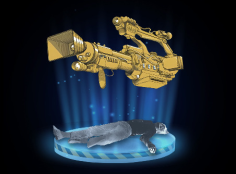Genetic engineering stands at the forefront of scientific advancement, promising breakthroughs in medicine, agriculture, and beyond. However, as Jeffrey Weinzweig’s novel “Contraptions” vividly illustrates, this power comes with a host of ethical complexities that cannot be ignored. In this article, we delve into the ethical questions raised by genetic manipulation as portrayed in “Contraptions,” exploring the moral dilemmas faced by characters and the broader implications for society.
The Promise and Peril of Genetic Engineering
“Contraptions” presents a world where genetic engineering has advanced to unprecedented levels, allowing for the manipulation of DNA with precision and ease. This opens up vast possibilities, from curing diseases to enhancing human traits. However, with great power comes great responsibility, and the novel forces readers to confront the darker side of genetic manipulation.
Playing God: The Quest for Perfection
One of the central ethical dilemmas in “Contraptions” revolves around the pursuit of perfection through genetic engineering. Characters grapple with the temptation to enhance their physical and mental attributes, raising fundamental questions about identity, autonomy, and the value of human diversity. The novel challenges readers to consider where the line should be drawn between legitimate medical intervention and unethical enhancement.
The Commodification of Life
Another pressing issue highlighted in “Contraptions” is the commodification of life itself. Genetic engineering opens up the possibility of creating designer babies, selecting desired traits and discarding others. This raises concerns about inequality, discrimination, and the erosion of human dignity. Weinzweig’s narrative forces us to confront uncomfortable truths about the potential consequences of treating life as a product to be tailored to our whims.
Genetic Mishaps and Unforeseen Consequences
Perhaps the most chilling aspect of “Contraptions” is its portrayal of genetic mishaps and unforeseen consequences. Despite the best intentions, experiments go awry, leading to grotesque deformities and untold suffering. This serves as a stark warning about the dangers of playing with nature’s delicate balance and underscores the need for caution and humility in the face of technological hubris.
The Slippery Slope of Genetic Determinism
“Contraptions” delves into the murky waters of genetic determinism, the notion that our genes predetermine our fate. Characters in the novel wrestle with questions of free will and agency in a world where genetic engineering offers the illusion of control over one’s destiny. This raises profound philosophical questions about the nature of human existence and the limits of scientific intervention. Weinzweig challenges readers to consider whether our genes should dictate our potential or whether there is room for individuality and self-determination beyond genetic predispositions.
Environmental and Societal Implications
Beyond the individual level, “Contraptions” also explores the broader environmental and societal implications of genetic engineering. The novel portrays a world where genetic modifications extend beyond humans to encompass plants, animals, and even the very fabric of the ecosystem. This raises concerns about unintended consequences, ecological imbalance, and the potential for irreversible harm to the natural world. Weinzweig prompts readers to reflect on the ethical responsibility we bear not only to ourselves but also to future generations and the planet as a whole.
Navigating the Moral Maze
In “Contraptions,” Jeffrey Weinzweig presents a thought-provoking exploration of the ethical minefield surrounding genetic engineering. Through its richly drawn characters and gripping narrative, the novel forces readers to confront the moral implications of tampering with the building blocks of life. As we stand on the brink of a genetic revolution, “Contraptions” serves as a timely reminder that with great power comes great responsibility, and the choices we make today will shape the future of humanity.
